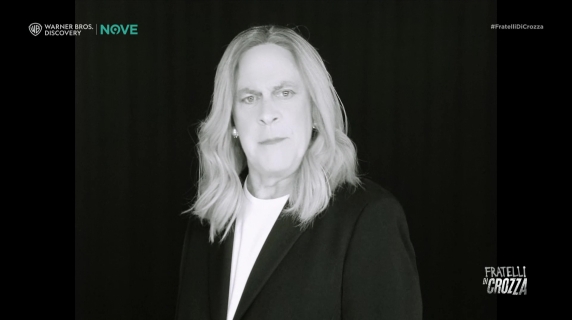Meloni's Tariff Stance: Crozza's Sharp Critique
Editor’s Note: Italy's political landscape is buzzing following Maurizio Crozza's latest satirical take on Giorgia Meloni's recent tariff pronouncements. This article delves into the controversy, analyzing Meloni's policies and Crozza's incisive commentary.
Why This Matters
Giorgia Meloni's economic policies, particularly her stance on tariffs, are shaping Italy's position within the EU and the global market. Crozza's satirical commentary provides a crucial lens through which to examine public perception and potential political repercussions. This article will explore the intricacies of Meloni's tariff approach, its potential impact on the Italian economy, and the effectiveness of Crozza's comedic critique in influencing public discourse. Understanding this interplay is vital for anyone following Italian politics, international trade, and the power of satire in shaping public opinion.
Key Takeaways
| Point | Summary |
|---|---|
| Meloni's Tariff Policy | Focus on protecting domestic industries through selective tariff increases. |
| Crozza's Satirical Take | Highlights perceived inconsistencies and potential negative consequences. |
| Economic Implications | Potential impact on Italian exports, imports, and consumer prices. |
| Political Ramifications | Influence on public opinion and potential shifts in political alliances. |
| EU Response | Potential friction with EU trade policies and regulations. |
Meloni's Tariff Stance
Introduction: Giorgia Meloni's government has signaled a shift towards a more protectionist trade policy, raising concerns among some economists and international partners. This approach marks a departure from previous administrations' emphasis on free trade agreements.
Key Aspects: The key aspects of Meloni's tariff stance include selective tariff increases on specific imported goods, a focus on supporting Italian industries facing foreign competition, and a stated commitment to negotiating fairer trade deals.
Detailed Analysis: While proponents argue that targeted tariffs can safeguard Italian jobs and industries, critics warn of potential retaliatory tariffs from other countries, harming Italian exports and increasing consumer prices. The government's approach lacks a comprehensive strategy, potentially leading to unintended consequences and economic instability.
Crozza's Critique: A Deep Dive
Introduction: Maurizio Crozza, a prominent Italian satirist, has consistently used his comedic platform to address significant political events. His recent segments focusing on Meloni's tariff stance have garnered significant attention and sparked considerable debate.
Facets: Crozza's critique dissects Meloni's pronouncements, highlighting perceived contradictions and potential pitfalls. He employs humor to expose the complexities of the issue, making it accessible to a wider audience and prompting critical reflection on the government's approach. The satire explores the potential for unintended consequences, from trade wars to increased costs for Italian consumers. The risks are presented through exaggerated scenarios, while the potential mitigations – such as carefully targeted tariffs and strong diplomatic negotiations – are implied but not fully explored. The overall impact, as portrayed by Crozza, is one of potential economic instability and a weakening of Italy's international standing.
Summary: Crozza's satire serves as a powerful counterpoint to the official narrative, prompting a broader public conversation about the potential costs and benefits of Meloni's tariff policies. His comedic approach enhances public engagement, effectively raising awareness of the complexities of the issue beyond the usual political commentary.
People Also Ask (NLP-Friendly Answers)
Q1: What is Meloni's tariff stance?
A: Meloni's government favors a more protectionist approach, advocating for selective tariff increases on certain imported goods to protect Italian industries.
Q2: Why is Crozza's critique important?
A: Crozza's satire brings a crucial public perspective to a complex economic policy, making the debate more accessible and prompting critical discussion.
Q3: How can Meloni's tariffs benefit Italy?
A: Proponents argue that targeted tariffs could protect domestic jobs and industries from unfair competition.
Q4: What are the main challenges with Meloni's tariff stance?
A: Potential retaliatory tariffs, increased consumer prices, and strained relations with international trade partners.
Q5: How might the EU respond to Meloni's policy?
A: The EU might express concern regarding potential violations of free trade agreements and regulations.
Practical Tips for Understanding Meloni's Economic Policy
Introduction: Navigating complex economic policies can be challenging. Here are some tips to understand Meloni's tariff stance better.
Tips:
- Read multiple sources: Consult various news outlets and economic analyses to gain a balanced perspective.
- Follow expert commentary: Pay attention to economists and trade specialists discussing the implications.
- Analyze data: Examine import/export figures and consumer price indices to understand the actual impact.
- Compare with other countries: Analyze how other nations use tariffs and their resulting outcomes.
- Follow social commentary: Understand the public's reaction through social media and news analysis.
- Consider long-term effects: Analyze the potential long-term impact on the Italian economy.
- Understand the EU context: Analyze the potential friction with EU trade policies.
- Watch Crozza's segments: Gain a humorous, yet insightful perspective on the public's response.
Summary: By using these tips, you can form a more informed opinion on the complex issue of Meloni's tariff policy.
Transition: Let's move on to the concluding thoughts.
Summary (Riepilogo)
This article explored Giorgia Meloni's approach to tariffs, highlighting the controversy surrounding her policies and examining Maurizio Crozza's satirical critique. The analysis revealed potential economic and political repercussions, emphasizing the importance of a nuanced understanding of the situation.
Closing Message (Messaggio Conclusivo)
The interplay between political policy and public perception, as highlighted by Meloni's tariff stance and Crozza's commentary, reveals the multifaceted nature of economic decision-making. What are your thoughts on the role of satire in shaping public opinion on such crucial issues?
Call to Action (Chiamata all'azione)
Share this article with your network to foster informed discussions about Italian politics and economics! Subscribe to our newsletter for more insightful analyses.
(Hreflang tags would be added here based on the intended target languages.)

